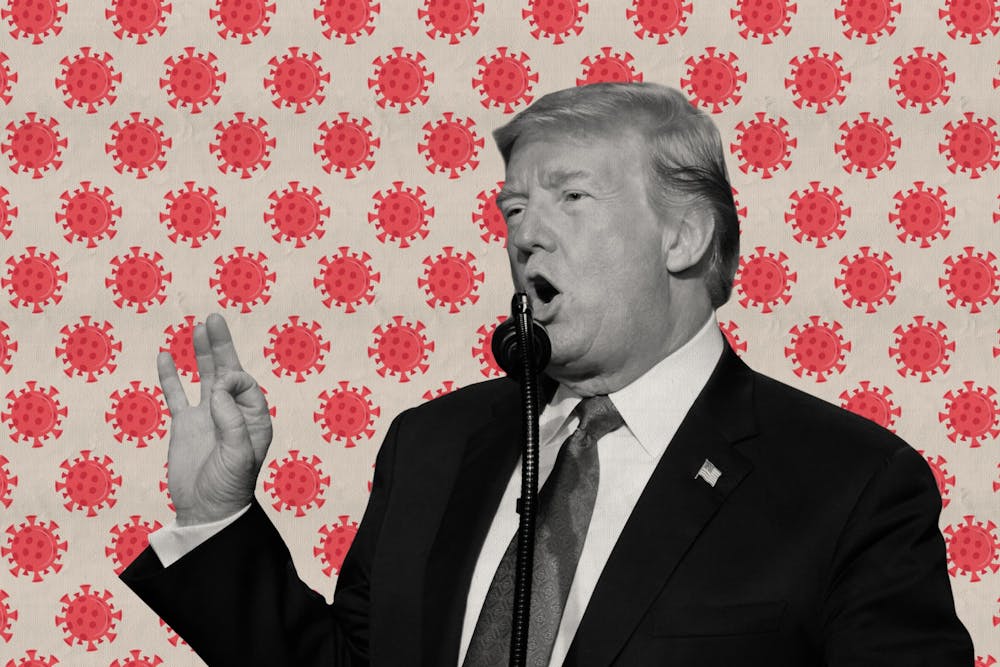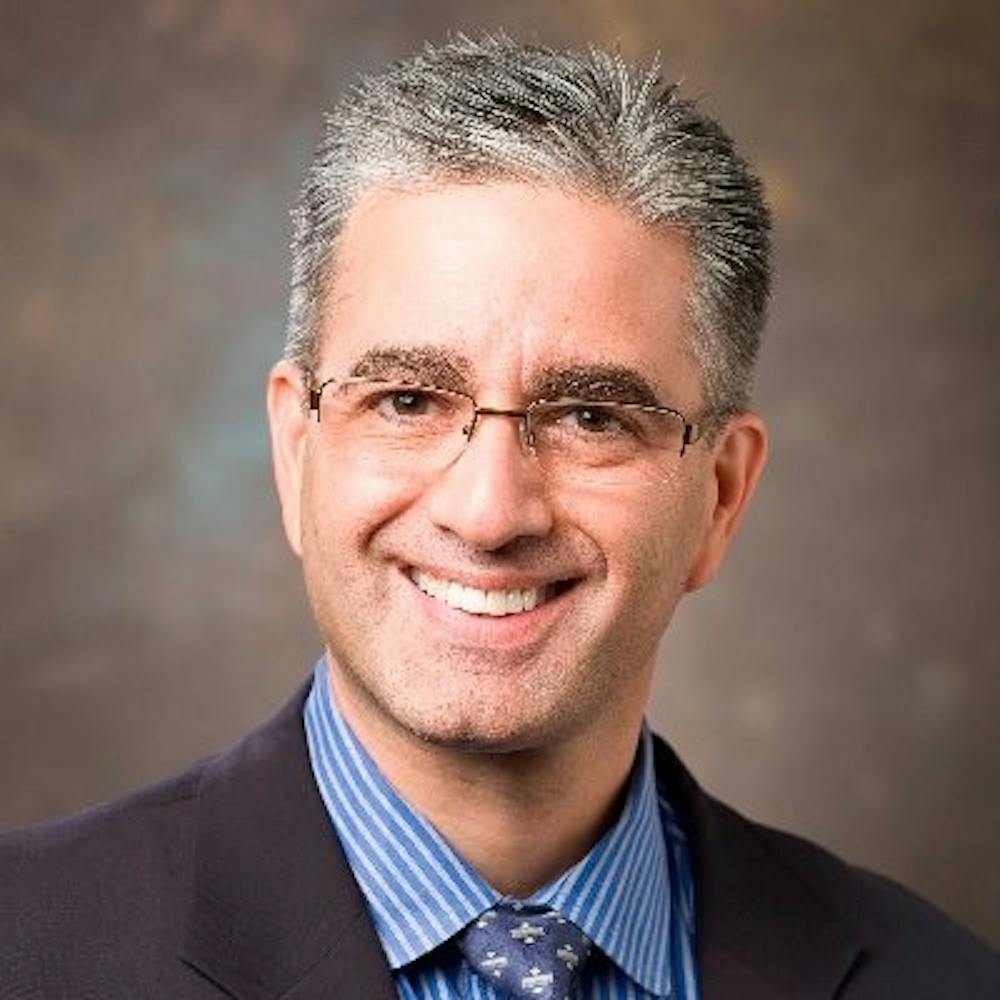
Experts at Penn's Perelman School of Medicine are raising questions about President and 1968 Wharton graduate Donald Trump's COVID-19 treatment, expressing confusion at the treatments administered to the president and criticizing his tendency to downplay the virus' severity.
Penn Med experts were bewildered by the combination of treatments given to Trump, which are commonly used for severely ailing patients, against the backdrop of his and his doctors' portrayal of the illness as mild. They further criticized Trump's messages and actions during the course of his illness, which they said marginalized public health guidelines and dangerously misled the public about the effects of COVID-19.
Trump, who is 74 years old, tweeted early on Oct. 2 that he had tested positive for COVID-19. Later that day, the president was flown to Walter Reed National Military Medical Center in Bethesda, Md.
Despite medical findings that symptoms can severely worsen during the second week of patients' diagnoses, Trump was released from the hospital just three days later. On Sunday, one day after Trump held his first public event since his diagnosis, White House physician Sean Conley announced that Trump is no longer contagious.
Lewis J. Kaplan, a professor of surgery and critical care doctor at the Hospital of the University of Pennsylvania, and president of the Society for Critical Care Medicine, said none of Trump's treatments are unusual in patients admitted to the intensive care unit, but rarely are they used for non-ICU patients like Trump.
He also noted that the drugs prescribed to Trump are rarely combined, as there is currently no data that shows how they might react with one another — particularly for a patient deemed in a high-risk group due to his age, weight, and mild heart condition.

Professor of surgery and critical care doctor at the Hospital of the University of Pennsylvania, and President of the Society for Critical Care Medicine Lewis J. Kaplan.
Trump's treatments include steroid dexamethasone, antiviral remdesivir, vitamin D, zinc, famotidine, and monoclonal antibodies. The use of the antibodies are not wide-spread as they are still in clinical trials, The Washington Post reported.
On inconsistencies between Trump’s treatment plan and Conley's positive reports of Trump's condition, Kaplan pointed out that it is likely the prescribed treatments were a precautionary approach for Trump, as he is the sitting head of state.
Kaplan cited "compassionate use," in which physicians can administer drugs that are restricted or not yet approved by the Food and Drug Administration. A requirement of "compassionate use" is that the patient in question must have "a serious or immediately life-threatening disease or condition, and there is no comparable or satisfactory alternative therapy to diagnose, monitor, or treat the disease or condition."
Dominic Sisti, assistant professor of Medical Ethics and Health Policy at Penn Med, also warned of the ills of VIP syndrome, wherein influential people call for and subsequently receive care that does not reflect best clinical practices.
"[Relapsing to the VIP's demands] is a problem for a number of reasons, but one of the most compelling reasons is that the outcomes are generally worse for VIPs because of this phenomenon."
He added that the side effects of the medications Trump is taking should not be overlooked.
"He's taking medications that we know affect judgment, impulsivity, mood, and rational, cognitive processes," Sisti said. "He's taking a steroid that can cause psychosis, and so, to know exactly what's happening with him, I think is imperative."

While the Health Insurance Portability and Accountability Act protects the privacy of patients' health records, Kaplan said gaining access to the data collected from Trump's consumption of this particular mix of drugs has the potential to "usher in a new era" of COVID-19 treatment.
"We really don't have anything else that is particularly useful against the virus, other than remdesivir, and that's useful only in the subset of patients who are already on a trajectory for survival," Kaplan said. "We have nothing to rescue people who are in deep trouble directly from the virus."
Sisti added that given the current public health pandemic, Trump's treatment and its outcome is an issue of national security and should be made as public of knowledge as possible. Regarding Trump's medical team, Kaplan acknowledged the difficult situation Trump's doctors find themselves in due to the public eye's constant scrutiny.
"It is easy for everyone to pontificate about what [Trump's medical team] should do or what they would do or what has or has not happened," he said. "This is a very high stress situation for all of them, and sometimes we can lose track of that."
What perturbs experts perhaps even more than Trump's COVID-19 treatment is his casual attitude and downplaying of the virus.
Following his release from the hospital on Oct. 5, the president tweeted: "Feeling really good! Don’t be afraid of Covid. Don’t let it dominate your life. We have developed, under the Trump Administration, some really great drugs & knowledge. I feel better than I did 20 years ago!"
He then went on to tweet a day later: "Flu season is coming up! Many people every year, sometimes over 100,000, and despite the Vaccine, die from the Flu. Are we going to close down our Country? No, we have learned to live with it, just like we are learning to live with Covid, in most populations far less lethal!!!"
Twitter has since flagged this tweet for "violating the Twitter Rules about spreading misleading and potentially harmful information related to COVID-19." CNN subsequently reported that COVID-19 is not "far less lethal" than the flu. The United States coronavirus fatality rate is 2.8%, according to Johns Hopkins University and Medicine, in comparison to the flu's mortality rate of 0.1% or 0.2% "at the most," Anthony Fauci, director of the National Institute of Allergy and Infectious Diseases at the National Institutes of Health, told USA TODAY.
It is also false that 100,000 people die of the flu every year in the United States. According to the Centers for Disease Control and Prevention, more people in the United States have died from COVID-19 — recording over 210,000 deaths — than have died from the flu over the past five flu seasons combined, CNN reported.
"He's utterly irresponsible, and that shouldn't be a surprise because that's how he is in general — utterly irresponsible," Sisti said. "He is trying to portray himself as ultra tough, superhuman, and in that ridiculous posturing, he's belittling the 220,000 Americans who have suffered and died from COVID-19."
Kaplan agreed, calling Trump's message not to be afraid of COVID-19 "antithetical to all public health measures."
"We've told people repeatedly: socially distance, wear a mask, wear it properly, wash your hands, and then to diminish the importance of doing those very standard, well established, evidence-supported public health measures I think is vastly inappropriate," he said.
Trump briefly left the hospital on Oct. 4, two days after announcing he tested positive for COVID-19, to drive past a group of supporters. NBC News reported at least two other people were in the car with Trump, raising concerns about possible COVID-19 transmission. After returning to the White House on Oct. 5, Trump immediately removed his mask for a photo op while standing in close proximity to his staff, again sparking concern about the potential spread of COVID-19.
Sisti said Trump's words and actions seem to indicate that he does not really care about the public health pandemic at all.
"When Trump does something, he does it to the most wrong degree possible, and so trying to cover up this illness or trying to downplay it — there's going to be long-lasting effects," he said.
The Daily Pennsylvanian is an independent, student-run newspaper. Please consider making a donation to support the coverage that shapes the University. Your generosity ensures a future of strong journalism at Penn.
Donate







